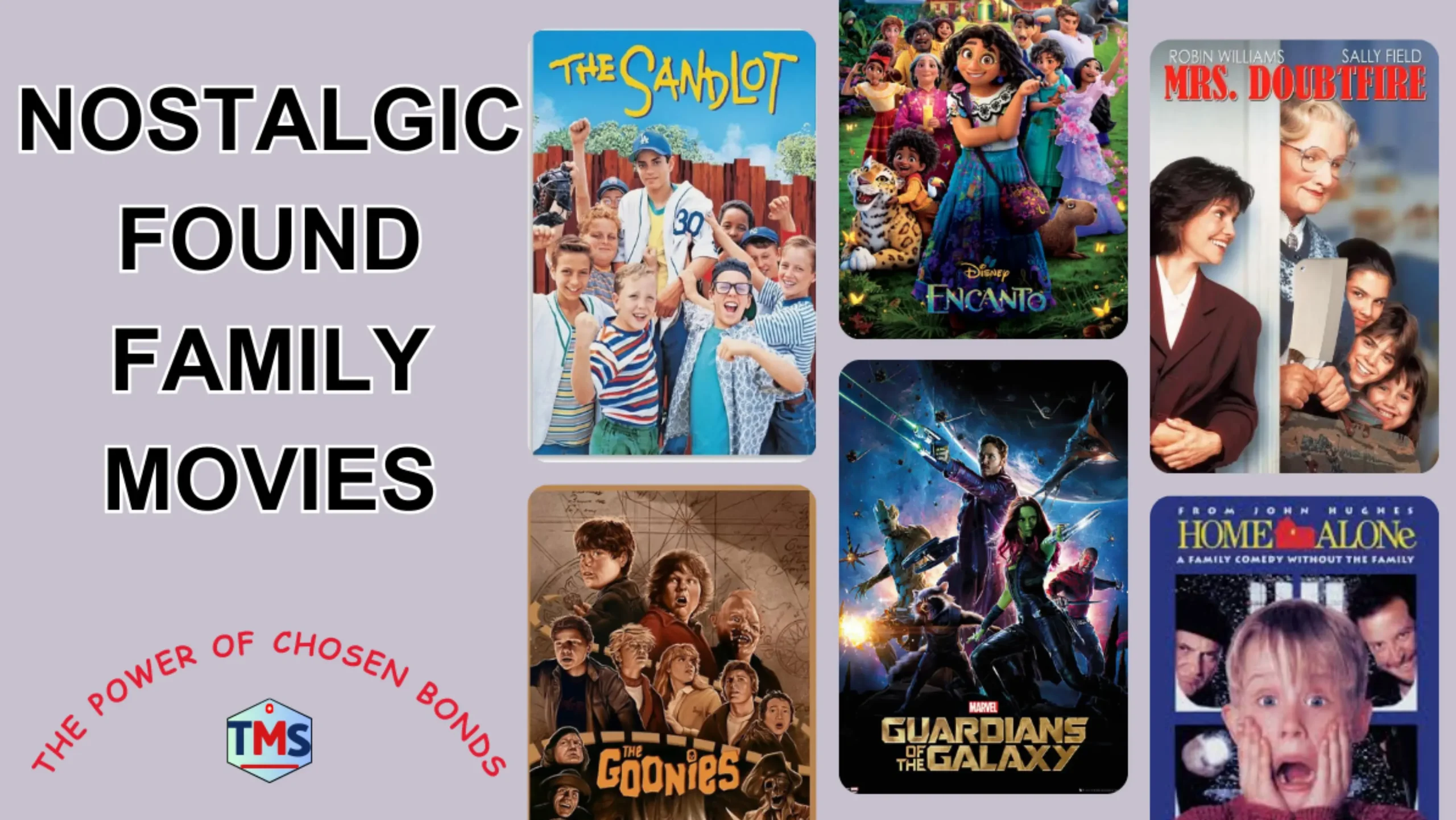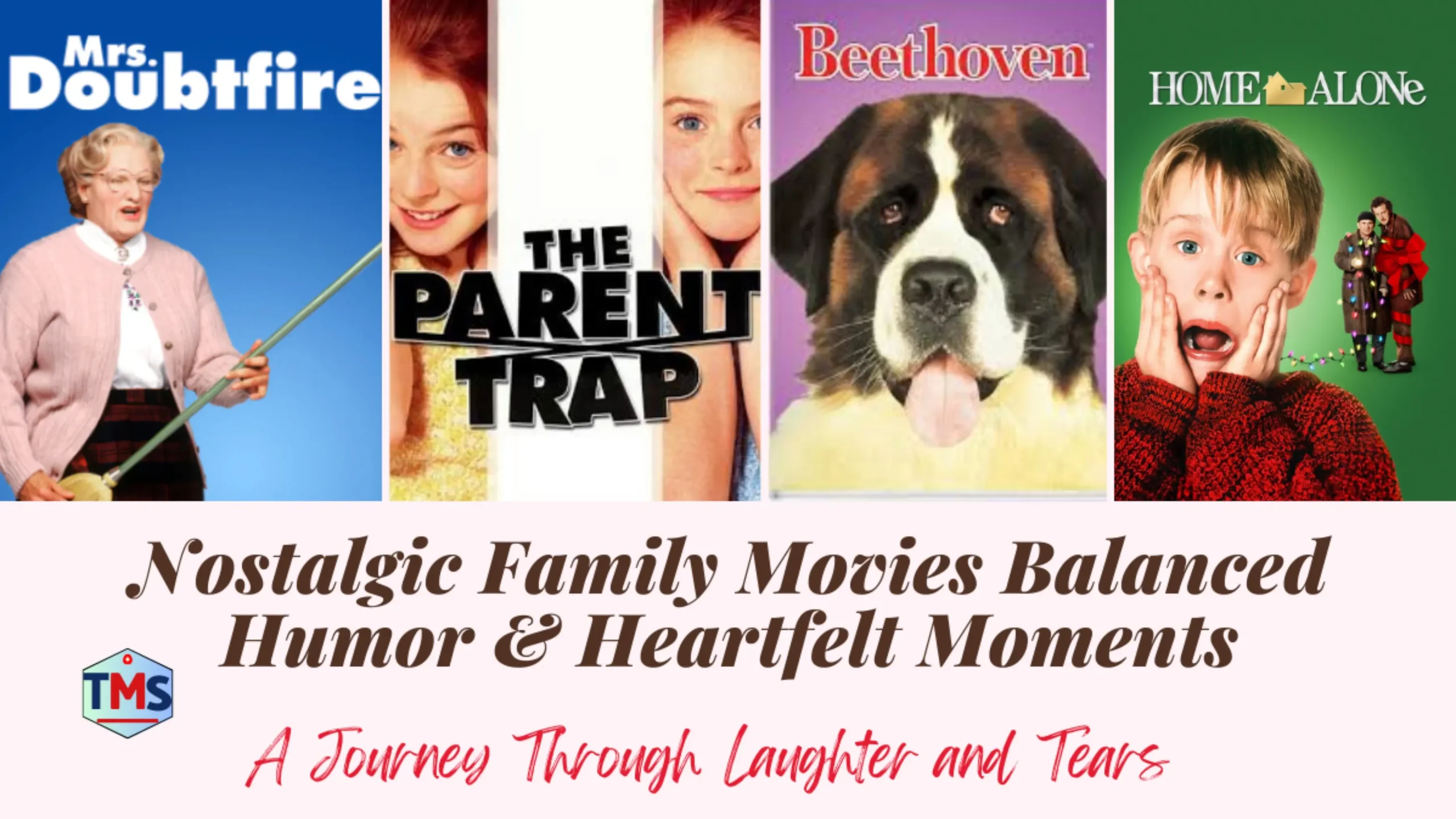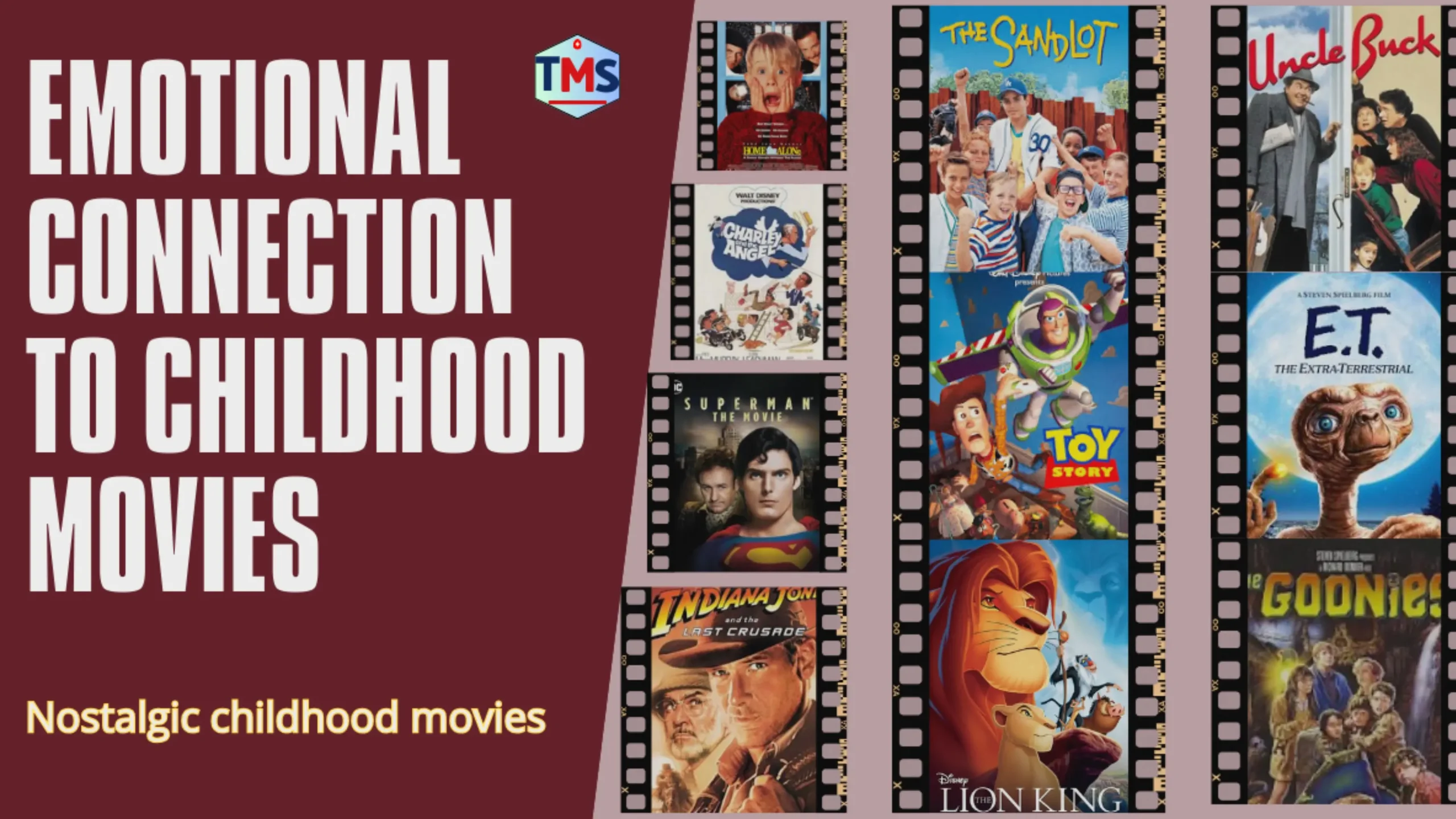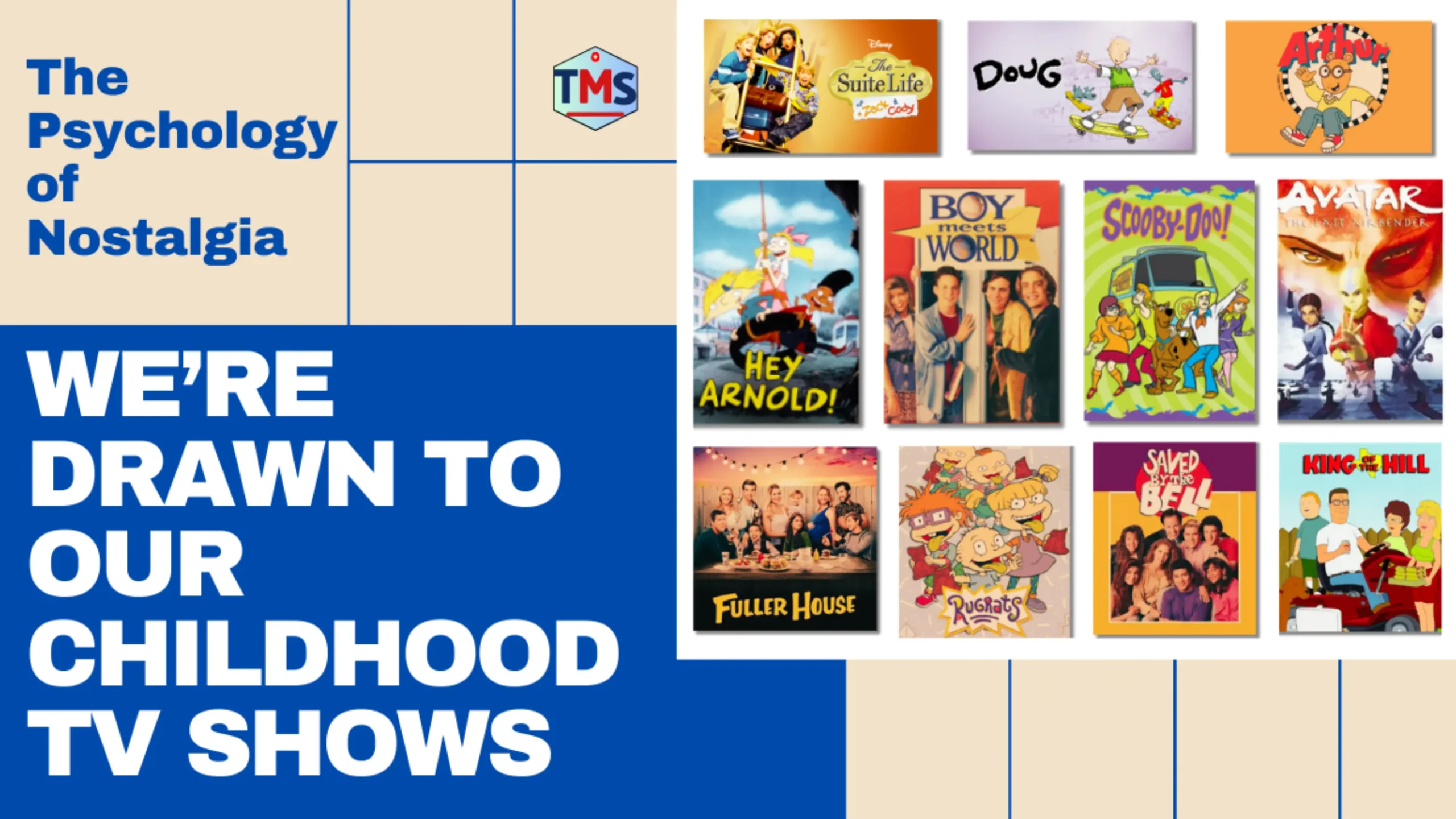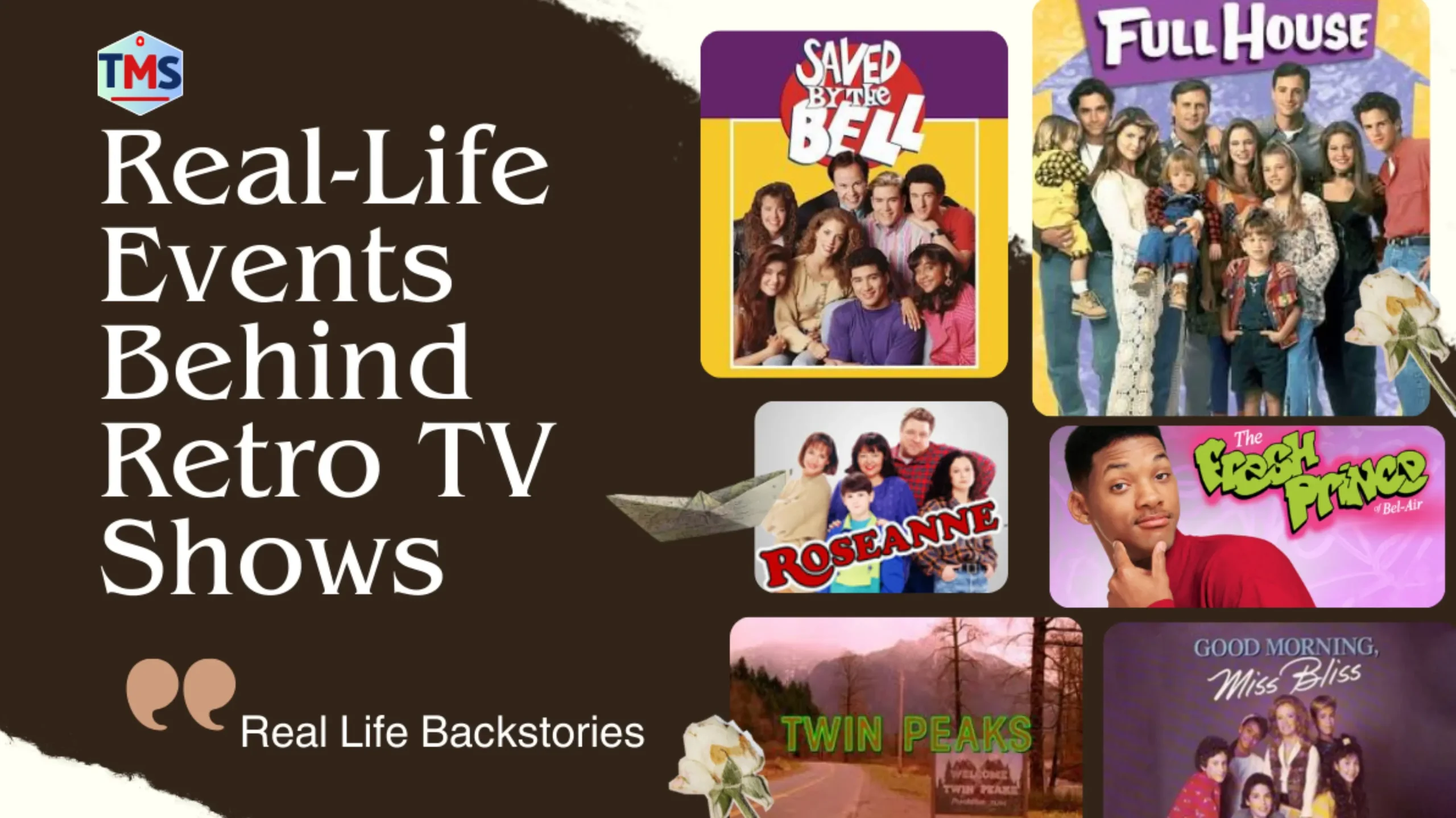Exploring the Heartwarming Power of Connection
Intro
Growing up in the golden era of VHS tapes and Saturday afternoon movie marathons, I never quite had the vocabulary to describe what drew me to certain films. There was something magical about watching a ragtag group of strangers gradually transform into something that resembled—and sometimes surpassed—traditional family units. Years later, I’d discover this beloved trope had a name: the found family narratives.
But why did this idea resonate so deeply in the ‘80s and ‘90s, and how did it shape storytelling and culture? Grab some popcorn, and let’s dive into the social, psychological, and narrative magic behind the “found family” phenomenon.
My Memories
I can’t pinpoint the exact moment I first fell in love with the idea of a “found family,” but I know for sure it started with the movies I watched as a kid. Growing up in the Midwest during the 90’s, Saturday nights were sacred. My parents, my little sister, and I would pile onto the couch with a mountain of buttery popcorn and press play on whatever VHS we’d rented from Blockbuster. More often than not, it was a feel-good movie about an unlikely group of misfits coming together to create something bigger than themselves. And looking back, those movies taught me lessons about family that I didn’t even realize I was learning at the time.
Take The Sandlot, for example. I was about ten when I first watched it, and at that age, there was something magical about seeing Scotty Smalls, the new kid in town, find his tribe among a ragtag bunch of baseball-loving kids. They weren’t just teammates—they became brothers. They had each other’s backs, whether it was chasing down a legendary home-run ball or navigating the terror of “The Beast.” To a kid like me, who had just moved to a new town and struggled to fit in at school, it was a revelation. Found family wasn’t just a story trope; it was hope.
And it wasn’t just The Sandlot. Movies like The Goonies, Home Alone, and even Mrs. Doubtfire played on this theme. They all had a way of showing that family wasn’t always about blood ties; it was about the bonds you chose to nurture. The Goonies, for example, weren’t connected by anything other than their shared sense of adventure and loyalty. Yet, by the end of their wild journey, they felt like siblings. And isn’t that what we all crave? A group of people who see us, flaws and all, and still choose to stand by us?
I think these movies struck a chord because they mirrored something so quintessentially American: the idea of building community in the face of adversity. In a country where people often move far from their extended families for jobs, school, or opportunity, the idea of finding your own “tribe” resonates deeply. It’s the heart of so many stories, from small-town neighborhoods to big-city dreams. Found families remind us that, no matter where we are, we’re never truly alone if we’re willing to connect with others.
Another movie that left a lasting impression on me was Home Alone. Sure, Kevin McCallister’s family was related by blood, but the “found family” aspect came through in how Kevin forged connections with unlikely allies—like Old Man Marley, the neighbor he once feared but grew to trust. It taught me that family could come from the most unexpected places, and sometimes, it’s the people you least expect who step up when it matters most.
Fast forward to today, and it’s clear that these narratives have staying power. Just look at the success of modern films like Guardians of the Galaxy or Encanto. They’re spiritual successors to the classics, continuing the tradition of celebrating found families in a way that feels both timeless and fresh. But for me, nothing beats the nostalgia of those original movies—the ones that shaped my understanding of what family could look like.
So why did feel-good family movies popularize the “found family” narrative? Because they tapped into something universal and unchanging: the human need for connection. Whether it’s a baseball team, a group of treasure hunters, or a quirky neighbor, these stories remind us that family isn’t always something you’re born into. Sometimes, it’s something you build, one heartfelt moment at a time.
Even now, as an adult, I find myself returning to those films whenever life feels a little overwhelming. They’re more than just entertainment; they’re reminders of what really matters. And maybe that’s why, decades later, the idea of a found family still resonates so deeply. Because at the end of the day, we’re all just looking for our people, aren’t we? And sometimes, just like in the movies, they show up when we least expect them but need them the most.
How Nostalgic Movies Shaped Found Family Narratives
Defining the “Found Family” Narrative
Before we dust off our VHS collections, let’s establish what we mean by “found family”. In literary and film analysis, a found family (sometimes called chosen family) describes a group of unrelated characters who form deep, familial bonds through shared experiences, mutual support, and emotional connection. Unlike biological families thrust upon us by circumstance, these are the people we actively choose to love and protect as our own.
Dr. Rebecca Martinez, a cultural sociologist at Stanford University, describes the phenomenon as “elective kinship”—relationships that fulfill the same psychological and emotional functions as traditional family structures but are formed through choice rather than blood. These narratives typically involve:
- Characters from different backgrounds finding connection
- Mutual support through adversity
- Development of trust and vulnerability
- Formation of lasting bonds that replace or supplement biological family
Social Context: Why the 80’s and 90’s Were Primed for Found Families
The surge in popularity of found family narratives during the 80s and 90s wasn’t coincidental. This period saw significant shifts in how Americans conceptualized “family”:
The divorce rate reached historic highs in the early 1980s, with nearly half of marriages ending in separation. Many children experienced fractured home lives, creating an audience receptive to stories about building new family connections.
Women’s increasing participation in the workforce transformed traditional family dynamics. The “latchkey kid” generation spent more time forming important bonds outside the nuclear family unit.
Geographic mobility meant more families lived far from extended relatives, creating cultural space for stories about surrogate family connections.
“The traditional American family was evolving,” notes film historian Janet Maslin. “Movies that showed characters creating meaningful family-like bonds outside of biological connections weren’t just heartwarming—they were reflecting a new social reality many viewers recognized”.
Simultaneously, the era’s emphasis on individualism and personal fulfillment made stories about choosing one’s people particularly resonant. After the conformity of earlier decades, the idea that we could assemble our own tribes felt revolutionary—and deeply comforting.
Psychological Appeal: Why We Love Watching Strangers Become Family
The enduring appeal of found family narratives isn’t just sociological—it’s deeply psychological. These stories tap into fundamental human needs:
Belonging: Abraham Maslow placed belonging third in his hierarchy of needs, just after basic physical requirements and safety. Found family stories show characters fulfilling this essential human need, often after periods of isolation.
Identity formation: Particularly for younger viewers, these films demonstrate how we discover who we are through our relationships with others. As developmental psychologist Erik Erikson noted, our sense of identity emerges largely through our connections.
Security in an insecure world: In an increasingly unpredictable cultural landscape, found family narratives offered reassurance that we could build safety nets of our own making.
When E.T. and Elliott form their unlikely bond, or when the mismatched housemates in “The Big Chill” reconnect, we’re witnessing characters satisfy these primal psychological needs—and perhaps fulfilling them vicariously ourselves.
The Golden Age: Iconic Found Family Films That Defined the Era
The 80s and 90s delivered some of the most memorable found family narratives in cinema history. Let’s revisit some classics that defined the genre:
“E.T. the Extra-Terrestrial” (1982): Perhaps the ultimate “found family” tale, where a lonely boy and an alien form an unlikely kinship stronger than biological ties. Spielberg masterfully uses the alien as a catalyst to strengthen Elliott’s existing family while creating a new form of connection.
“The Goonies” (1985): A band of neighborhood kids from different backgrounds unite for adventure, forming unbreakable bonds in the process. The genius of this film lies in how it shows children actively choosing each other while navigating their existing family complications.
“Stand By Me” (1986): Four boys from broken or troubled homes find understanding and acceptance in each other that they can’t get at home. Their journey represents both physical and emotional discovery.
“Mrs. Doubtfire” (1993): While technically about a biological family, this film explores how family bonds can be maintained and even strengthened through unconventional arrangements.
“The Mighty Ducks” (1992): A reluctant coach and a team of misfit young hockey players gradually transform from adversaries into a supportive community, showing how shared goals can forge family-like bonds.
“Toy Story” (1995): Animated but no less profound, this Pixar classic showed toys forming their own supportive community, complete with leadership, conflicts, and ultimately, unconditional acceptance.
I still remember watching “The Sandlot” (1993) during a childhood summer that felt endless. The ragtag baseball team’s dynamics mirrored my own neighborhood friendships—we weren’t related, but those summer bonds felt as significant as any family connection. That’s the power of these narratives; they validated the importance of the families we make, not just the ones we’re born into.
Narrative Techniques: How These Films Make Us Invest in Found Families
These films didn’t just stumble into emotional resonance—they employed specific storytelling techniques to make viewers invest in these makeshift families:
The “First Meeting” Sequence: Most found family narratives feature carefully crafted introduction scenes that highlight differences between characters, setting up the journey toward connection. Think of the memorable first practice in “The Mighty Ducks” or the initial space meeting in “E.T.”
Shared Adversity: Nothing bonds characters like overcoming challenges together. Whether facing supernatural threats (“The Goonies”), sports competitions (“Cool Runnings”), or personal growth obstacles (“Dead Poets Society”), external pressures force characters to rely on each other.
The “Family Meal” Scene: Almost universally, these films include pivotal scenes where characters share food together—a primal symbol of family across cultures. From pizza parties to holiday gatherings, these moments visually cement the formation of new kinship structures.
The Vulnerability Breakthrough: Each character typically has a moment where they lower their defenses and reveal something deeply personal, often triggering a turning point in the group dynamic.
Rituals and Inside Jokes: Found families develop their own “family culture” through shared rituals, inside jokes, and traditions that signify belonging. Think of the “Truffle Shuffle” in “The Goonies” or the quacking in “The Mighty Ducks.”
These techniques create what screenwriter William Goldman called “emotional scaffolding”—structures that support the audience’s investment in relationships that form before our eyes.
Character Archetypes: The Building Blocks of Found Families
Look closely, and you’ll notice recurring character types populating these narratives:
The Reluctant Leader: Often with their own wounds to heal, this character initially resists connection but ultimately becomes the family’s emotional center (Gordon Bombay in “The Mighty Ducks,” Han Solo in “Star Wars”).
The Outcast: A character who’s never fit in elsewhere finds acceptance within the found family (“Data” in “The Goonies”, Benny “The Jet” Rodriguez in “The Sandlot”).
The Heart: This character explicitly values the family connection and works to maintain group harmony (Chunk in “The Goonies”, Ducky in “Pretty in Pink”).
The Mentor: Older and wiser, this character provides guidance while receiving their own healing through the new connections (Mr. Miyagi in “The Karate Kid”).
The Skeptic: Initially resistant to the group’s formation, this character’s eventual buy-in represents a key emotional victory (Jessie in “Free Willy”).
These archetypes create relatable entry points for different viewers while establishing the interpersonal dynamics that drive the narrative forward.
Today’s Legacy: Found Families in Contemporary Media
The found family narrative continues to evolve in fascinating ways:
Modern franchises like “Guardians of the Galaxy” explicitly center found family dynamics, with director James Gunn citing 80’s films as direct inspiration.
Streaming shows like “Ted Lasso” and “The Good Place” feature more diverse and complex found family structures, building on the foundation established decades earlier.
Pixar continues the tradition with films like “Coco” that explore the relationship between biological heritage and chosen connections.
What began as a heartwarming trope in family films has become one of storytelling’s most versatile and emotionally resonant frameworks. The children raised on VHS tapes of “The Goonies” and “E.T.” grew up to create their own found family narratives, expanding and diversifying the tradition.
Conclusion: Why Found Family Narratives Endure
In an age of increasing social isolation, political division, and digital distancing, perhaps it’s no surprise that found family narratives continue to resonate. They remind us of a fundamental truth: family isn’t just something we’re born into—it’s something we can actively create.
Those nostalgic films from the 80’s and 90’s weren’t just entertaining us—they were teaching us an essential lesson about human connection. They showed us that family can be formed in the most unlikely circumstances, between the most different people, if we’re brave enough to lower our defenses and let others in.
So the next time you find yourself tearing up as a group of misfits finally comes together on screen, remember: you’re not just witnessing a storytelling trope. You’re experiencing one of cinema’s most profound contributions to how we understand belonging, connection, and the families we choose along the way.
And if that makes you want to call your own chosen family—whether they came from childhood adventures, college dormitories, or workplace friendships—well, that’s exactly what the filmmakers would have wanted.
Podcast with Eileen Kennedy-Moore, PhD
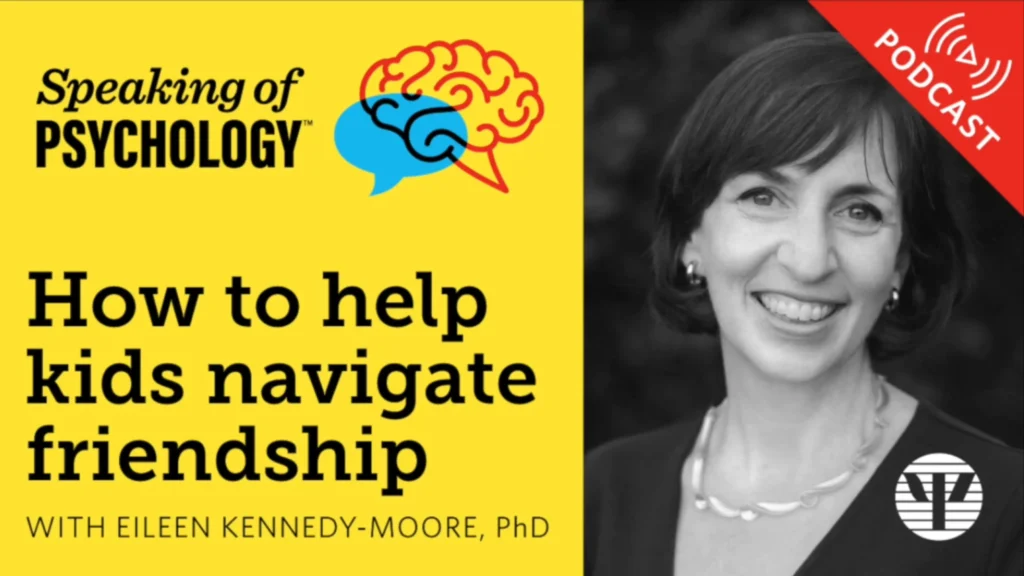
Frequently Asked Questions (FAQs)
What is a “found family” in movies?
A “found family” is a group of unrelated characters who form close, family-like bonds through shared experiences, like in The Goonies or Hook.
Why were found family narratives popular in 80’s and 90’s films?
Social shifts like rising divorce rates and urbanization made chosen families relatable, reflecting a need for connection beyond traditional family structures.
What psychological needs do found family narratives fulfill?
Found family narratives fulfill psychological needs for belonging, acceptance, and security. They show characters finding unconditional support outside traditional family structures, demonstrating how chosen relationships can satisfy fundamental human needs for connection and identity formation—especially appealing to viewers experiencing isolation or family disruption.
What’s the difference between a found family and a chosen family?
While often used interchangeably, “found family” typically emphasizes the unexpected discovery of kinship-like bonds with previously unconnected individuals, while “chosen family” emphasizes the deliberate selection of non-biological relationships as primary support systems. In film narratives, characters often “find” their chosen families through circumstance before actively choosing to maintain those bonds.
Did found family tropes appear in other genres?
Yes, sci-fi (Star Wars: Return of the Jedi) and action (Die Hard) films used found family dynamics to build team bonds.
How do found family narratives reflect societal changes?
They mirror shifts like blended families and community focus, showing chosen bonds as valid in a changing world.
How did found family narratives impact modern entertainment?
Found family narratives transformed modern entertainment by popularizing character dynamics now common in franchises from Marvel to “Fast and Furious.” They influenced TV shows like “Friends,” “Stranger Things,” and “The Good Place,” helped normalize diverse family structures in media, and created storytelling frameworks that remain commercially successful decades later.

